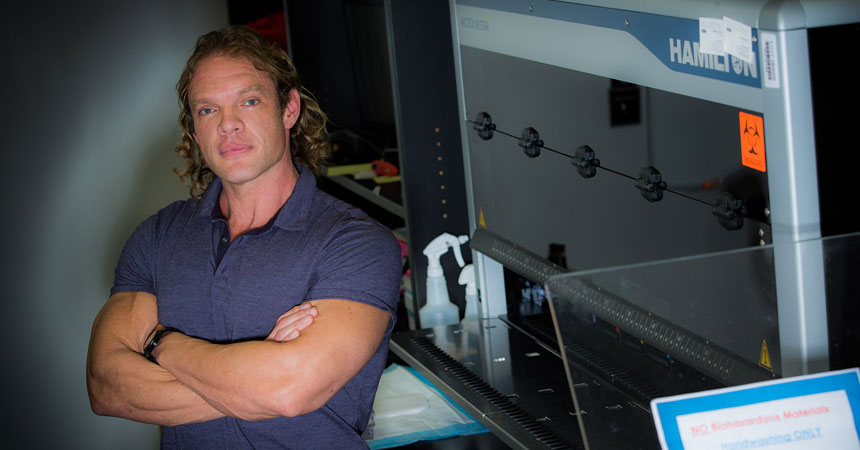UNTHSC establishes new Institute for Translational Research
By Jan Jarvis

It often takes many months and thousands of dollars for patients worried about memory loss to find out if they have Alzheimer’s disease.
The goal of UNT Health Science Center’s new Institute for Translational Research is to reduce that timeline, giving patients access to therapeutics and diagnostics faster than ever before. The new institute is expected to translate basic science into treatments and new procedures for Alzheimer’s and other diseases.
It’s a huge step for UNTHSC, said Sid O’Bryant, PhD, Professor and the newly named Executive Director of the Institute for Translational Research.
“This is going to move research forward much more rapidly,” he said. “There are going to be so many opportunities to help patients.”
The bench-to-bedside approach that characterizes translational research means that scientific discoveries will advance to human trials with the highest possible chance of success. Ultimately, patients benefit from receiving cutting-edge therapies quicker.
While Alzheimer’s research will play a big role, other areas of study from across campus will also benefit from being part of this exciting opportunity to position the Institute as a leader in translational research.
It will be located on the fifth floor of the Health Pavilion. Renovations are to be complete by late December or in January.
The decision to open an institute falls in line with UNTHSC’s strategic plan, which includes focusing on growth and opportunities, said Charles Taylor, PharmD, Provost and Executive Vice President for Academic Affairs.
“We’re putting a stake in the ground and saying we have declared translational research as part of our strategy,” Dr. Taylor said.
Two large and unique cohort studies that are already underway have focused attention on UNTHSC and proven the institution is equipped to handle large projects.
The most visible project is a blood test to detect Alzheimer’s disease within a primary care setting. Participants are already being recruited across North Texas. It is the first-ever study of a blood-screening test for biomarkers to be used with primary care patients.
This unique study will set the stage for novel multi-modal treatment and prevention studies right here in UNTHSC primary care clinics, Dr. O’Bryant said. For most patients, the blood test could be done in their doctor’s office and provide relief from the fear of having Alzheimer’s. Those who do have the disease would benefit from early detection.
Dr. O’Bryant is also overseeing one of the largest and most comprehensive studies ever conducted in the United States focused on Mexican-Americans and Alzheimer’s disease. This five-year study began in 2017 and is funded by a $12 million grant from the National Institutes of Health. Currently 1,000 Mexican Americans and 1,000 non-Hispanic whites from the DFW region are being enrolled in the study.
“This is the first project to specifically attempt to understand how different biological causes relate to Alzheimer’s disease across ethnicities,” said Dr. O’Bryant. “By looking at different potential causes related to memory loss, we may be able to target the right pathway at the right time with the right intervention.”
UNTHSC has a well-established reputation for basic science research, Dr. Taylor said. The establishment of the institute will expand on that reputation. The establishment of this new institute is a strategic new direction for the entire campus, he said.
“We believe the Institute for Translational Research is important as it will accelerate the process of translating basic science discoveries into treatments for patients,” Dr. Taylor said. “It allows us to provide the full continuum of ‘bench-to-bedside’ science.”



![Uyen Sa Nguyen Scaled[58]](https://www.unthsc.edu/newsroom/wp-content/uploads/sites/16/Uyen-Sa-Nguyen-scaled58-145x175.jpg)

Social media